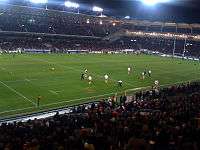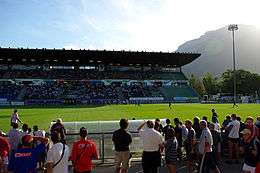1972 Rugby League World Cup
| 1972 World Cup | |
|---|---|
| Number of teams | 4 |
| Host country |
|
| Winner |
|
|
| |
| Matches played | 7 |
| Attendance | 62,456 (8,922 per match) |
| Points scored | 240 (34.29 per match) |
| Top scorer |
|
| Top try scorer |
|
The sixth Rugby League World Cup was held in France in October and November 1972. Australia started as the favourites to retain the trophy they had won just two years previously. New Zealand had beaten all three of the other nations in 1971 and France were expected to be tough opponents on their home soil. In the event Great Britain confounded most expectations by running out worthy winners and levelling their tally of World Cup wins at 3–3 with the Australians.
The final was held at Stade Gerland in Lyon. Great Britain played Australia and in the end, with scores level and unchanged after extra time, claimed the cup on league placing.
This was the last World Cup to be played under the four-tackle rule.
Squads
Australia
The Australian team was coached by Harry Bath
- Graeme Langlands (c) fullback from St. George
- Arthur Beetson, prop/second row forward from Eastern Suburbs
- Ray Branighan, centre/wing from Manly-Warringah
- Bob Fulton, five-eight/centre form Manly-Warringah
- John Grant, centre/wing/fullback from South Brisbane
- Mark Harris, centre/wing from Eastern Suburbs
- Bob McCarthy, second row forward from South Sydney
- John O'Neill, prop-forward from Manly-Warringah
- Bob O'Reilly, prop forward from Parramatta
- Tommy Raudonikis, half-back from Western Suburbs
- Geoff Starling, centre/wing/fullback from Balmain
- Gary Stevens, second row forward from South Sydney
- Gary Sullivan, lock forward from Newtown
- Dennis Ward, half-back from Manly-Warringah
- Elwyn Walters, hooker from South Sydney
Great Britain
The Great Britain team was coached by Jim Challinor
- Clive Sullivan (c), wing from Hull
- John Atkinson, wing from Leeds
- Paul Charlton, fullback from Salford
- Terry Clawson, prop/second row forward from Leeds
- Chris Hesketh, centre/five-eight from Salford
- John Holmes, five-eight from Leeds
- Bob Irving, second row forward from Oldham
- David Jeanes, prop forward from Leeds
- Brian Lockwood, second row forward from Castleford
- Phil Lowe, second row forward from Hull KR
- Steve Nash, halfback from Featherstone Rovers
- George Nicholls, lock forward from Widnes
- David Redfearn, wing from Bradford Northern
- Mike Stephenson, hooker from Dewsbury
- John Walsh, utility back from St Helens
New Zealand
Mita Mohi
Venues
The games were played at various venues in England, Wales, Scotland, Ireland, France.
The Twickenham Stadium in London, the home of the English rugby union was the host stadium for the opening ceremony and match featuring hosts England and defending champions Australia.[1]
| Marseille | Paris | Toulouse |
|---|---|---|
| Stade Vélodrome | Parc des Princes | Stadium Municipal |
| Capacity: 55,000 | Capacity: 48,712 | Capacity: 37,000 |
 |
 |
 |
| Perpignan | Pau | Grenoble |
| Stade Gilbert Brutus | Stade du Hameau | Stade Lesdiguières |
| Capacity: 13,000 | Capacity: 12,000 | Capacity: 12,000 |
| |
 |
 |
Final Venue
| Lyon |
|---|
| Stade de Gerland |
| Capacity: 45,000 |
| |
Results
France kicked off the tournament by sharing six tries with the Kiwis but a massive penalty count in their favour allowed the French to dictate play, their five goals and a drop goal to none by the Kiwis proving decisive.
At Perpignan a monumental struggle finally went Britain's way 27–21 against the Kangaroos, for whom Bobby Fulton grabbed three tries in a lost cause.
Britain overcame France 13–4 to qualify for the final with outstanding second-rower Phil Lowe scoring two tries.
New Zealand gave Australia a hard time, the first half being scoreless, before going down 5–9.
Britain hammered New Zealand 53–19, a World Cup record score, with young stand-off half John Holmes collecting 26 points (10 goals, 2 tries) – another World Cup record.
Australia had to beat France at Toulouse to reach the final in the last game of the preliminaries, a task which proved well within their capabilities.
Final standings
| Team | Played | Won | Drew | Lost | For | Against | Difference | Points |
|---|---|---|---|---|---|---|---|---|
| | 3 | 3 | 0 | 0 | 93 | 44 | +49 | 6 |
| | 3 | 2 | 0 | 1 | 61 | 41 | +20 | 4 |
| | 3 | 1 | 0 | 2 | 33 | 53 | −20 | 2 |
| | 3 | 0 | 0 | 3 | 33 | 82 | −49 | 0 |
Final
Saturday, 11 November |
| Great Britain |
10 – 10 ET |
|
|---|---|---|
| Tries: Clive Sullivan Mike Stephenson Goals: Terry Clawson (2) |
Tries: Arthur Beetson John O'Neill Goals: Ray Branighan (2) |
The French public seemed uninterested in a final that did not involve the home team, as less than 4,500 spectators turned up. The game will always be remembered by the British for their captain Clive Sullivan's wonderful long distance try[2][3] and by the Australians for perhaps "the greatest try never scored",[4] later shown on TV to be legitimately scored by Australian fullback Graeme Langlands but disallowed by French referee Georges Jameau.[5] Mike Stephenson scored the 73rd-minute try that helped Great Britain level the scores and secure the World Cup.[6] Had Aussie winger Ray Branighan succeeded with a 79th-minute penalty or Bob Fulton landed one of three drop goal attempts in the last five minutes, the cup could easily have gone to Australia. But for the first time in the competition's history the scores were level at full-time. An additional twenty minutes extra time was played, but no further score resulted, and Great Britain were awarded the cup by virtue of a better position in the table.
References
- ↑ "England draw Australia in 2013 Rugby League World Cup". BBC News. 30 November 2010. Archived from the original on 1 December 2010. Retrieved 30 October 2010.
- ↑ Wright, J (23 August 2007). "Rugby League's Greatest Ever Full-back". Times & Star. Archived from the original on 24 December 2013. Retrieved 24 June 2012.
- ↑ Paddy McAteer (22 December 2010) "Whole World in their Hands" Archived 5 October 2012 at the Wayback Machine. North West Evening Mail
- ↑ Kdouh, Fatima (28 November 2013). "We take a look back at the greatest Rugby League World Cup finals of all time". The Daily Telegraph. Retrieved 23 December 2013.
- ↑ Chesterton, Ray (24 October 2008). "Langlands denied greatest try ever". The Daily Telegraph. Australia: News Limited. Retrieved 6 February 2011.
- ↑ Hughes, Ed (31 October 2004). "Caught in Time: Great Britain prepare for 1972 rugby league World Cup final". The Sunday Times. UK: Times Newspapers Ltd. Retrieved 18 October 2010.
External links
- 1972 World Cup at rlhalloffame.org.uk
- 1972 World Cup at rugbyleagueproject.com
- 1972 World Cup Final at eraofthebiff.com
- When Great Britain won the World Cup at bbc.co.uk
- 1972 World Cup Final at timesonline.co.uk
- 1972 World Cup data at hunterlink.net.au
- 1972 World Cup at 188-rugby-league.co.uk